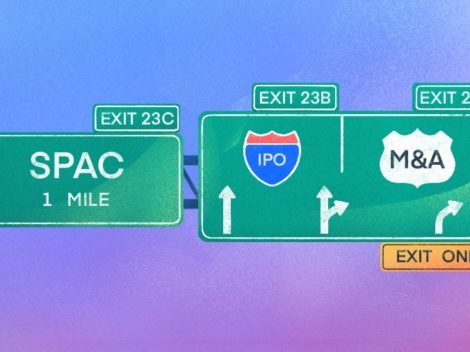Have you ever wondered why the Netflix thumbnails for your favorite movies and TV shows change so often?
The company is obsessed with figuring out exactly what kinds of visuals you will click on. And, thanks to generative AI, that obsession is going to spread.
Two of the largest digital ad platforms in the world — Google and Meta — have loudly voiced their enthusiasm for artificial intelligence. Google is itching to use its generative AI platform to create ad campaigns that rival those made by advertising agencies. Companies that want to advertise on the platform will send in specific visuals and text that the AI can “remix” to create ads that are targeted toward specific viewers.
Search less. Close more.
Grow your revenue with all-in-one prospecting solutions powered by the leader in private-company data.
Meta, according to CTO Andrew Bosworth, is looking to do something similar across Facebook, Instagram and WhatsApp.
Generative AI is bulldozing through every industry possible, and the world of advertising and brand marketing isn’t immune. Startups are popping up that promise to create flawless ad copy and brand design fast, and at a fraction of the price and time it would take people to do that work.
But generative AI adoption in content is still nascent, and venture firms need to make a split-second decision: Should they hop on this fast-moving train with the hope of making it to paradise, and hope it doesn’t crash along the way?
“VCs are basically throwing hundreds of millions of dollars at teams that maybe don’t have the right credentials and basically have an idea,” said Eric Hippeau, co-founder of the enterprise-focused VC firm Lerer Hippeau. “It requires a little pause to figure out who are going to be the winners.”
How do startups compete?
Perhaps it’s not surprising that advertising and marketing are being inundated with generative AI applications. Both fall under the general umbrella of content creation, which tools like ChatGPT and Midjourney have pioneered for text and visuals.
“Marketing content generation — anybody can use the foundation model and let it generate,” said Jeremy Kaufmann, a partner at Scale Venture Partners focused on automation. “You let it generate, you give it a prompt, it’s nothing special.”
Jasper, a Canada-based generative AI tool, was trained by copywriters to spit out original ad copy or Instagram captions. It boasts a slogan generator and text summarizer. The company has raised $131 million, per Crunchbase data.
Then there’s Typeface, which launched in February with $65 million in funding to create visual branding and blog posts for small companies.
These kinds of companies perhaps have the potential to disrupt the industry for the better — instead of working on five or six different variations of the same ad, artists, designers and writers can focus on branding aesthetic, tone and voice.
But startups in this space have to come up with a value-add that goes beyond what free language models already offer in order to produce a long-term business model.
“What are the features on issues that look really promising today, but would in fact be absorbed as part of the basic value?” Hippeau said. “It’s too early to tell what’s going to be part of the basic platform and what’s going to be a standalone growth business that is big enough to be backed by venture capital.”
AI adtech startups go niche
Constellation, another adtech startup, bills itself as a marketing firm that specializes in highly regulated industries such as auto manufacturing, biotech and insurance. The company recently began using generative AI in the space of highly regulated industries, which has long been a tough area for scalable adtech solutions to penetrate.
“AI is a very big thing right now, and everybody is homing in on it, and they want to use it for everything that’s out there,” Constellation co-founder Diana Lee said. “The problem is industries that are highly regulated are scared of AI because that can cause a lot of lawsuits, right?”
Let’s use pharma as an example. Pharma companies are required to abide by strict, and often subjective, advertising standards issued by the U.S. Food and Drug Administration. Using the wrong words in an advertisement — there can be a difference between “shown,” “proven” and “demonstrated” — could mean a pharma company has to stop commercialization and pay a massive fine.
An adtech startup that takes on a pharma client also has to keep track of all these regulations.
Constellation builds parameters into the AI for each industry in order to help with this process. It allows the marketing firm to use generative AI while still ensuring the platform meets the regulatory standards of its clients.
Startups building language models based on a proprietary source of information could be the key to winning venture firms’ hearts.
“A lot of people, myself included, are interested in those use cases because suddenly the folks that own unique data have an advantage to own the process that revolves around that proprietary information, rather than generating marketing content that anyone can do,” Kaufman said.
Perhaps it’s the downfall of huge crypto firms, or the slow innovation in the metaverse, but it looks like tagging your company as one that uses generative AI isn’t enough for venture firms these days.
“This is in the context of a lot of mania, right?” Hippeau said. “We had the crypto mania, the Web3 mania, and now we have the AI mania.”
Illustration: Dom Guzman

Stay up to date with recent funding rounds, acquisitions, and more with the Crunchbase Daily.







![Illustration of a guy watering plants with a blocked hose - Global [Dom Guzman]](https://news.crunchbase.com/wp-content/uploads/quarterly-global-3-300x168.jpg)
67.1K Followers